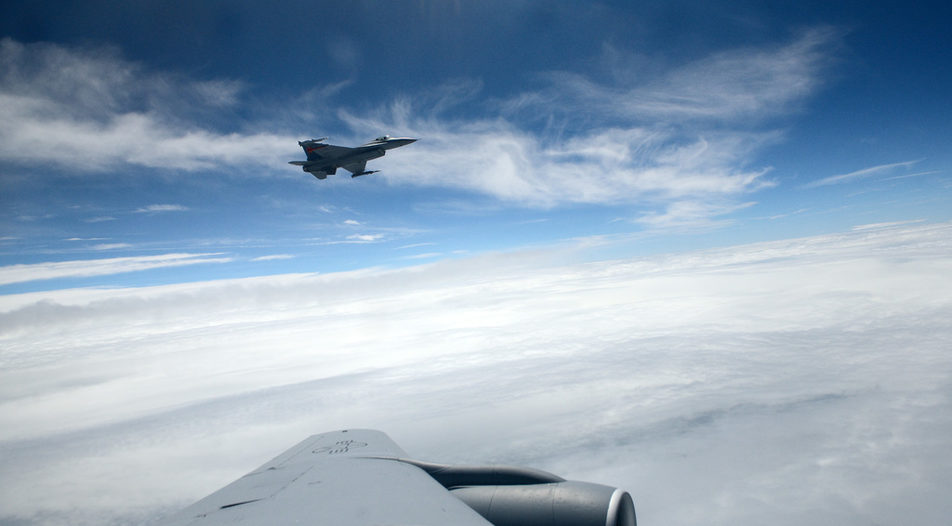Fifteen years after it joined NATO, Bulgaria has finally made a decisive step away from its Soviet-era military hardware by acquiring US-made new fighter jets. Up until now, NATO member Bulgaria had merely procured several unarmed transport planes and helicopters, as well as second-hand Belgian frigates for its Navy.
The Air Force will receive 6 combat and 2 two-seater trainer F-16 Block 70 fighter jets worth a total of $1.256 billion, or 2.18 billion levs under a deal with the US ratified by parliament in July that aims to replace Bulgaria's ageing fleet of Russian-made MiG-29 fighters. The deal also includes armaments for the aircraft, training of pilots and installing an F-16 flight simulator at the Air Force Academy in Dolna Mitropolia.
Bulgaria's defence ministry paid the entire agreed sum in August, with the first aeroplanes to be delivered in about 3 years. The government had hoped to win a price cut of about 100 million levs but this did not materialize. Even this price, which is 300 million levs above the initially approved spending ceiling, only includes partial equipping and arming of the aeroplanes. The Bulgarian government believes that this will not reduce the fighting capability of the aircraft, even though the eight jets will only have ammunition for one combat mission each. Subsequently, the warplanes will be equipped within the maximum 2.9 billion levs budget approved by the US Congress, based on needs specified by Bulgaria.
Defence Minister Krassimir Karakachanov claimed that as a counterbalance, the US has pledged to spend around $60 million on improving the infrastructure of the Graf Ignatievo airfield where the new fighters will be based. Rough estimates put the cost of the necessary repairs at about $100 million.
Economy minister Emil Karanikolov announced that the F-16 manufacturer Lockheed Martin will establish an airplane maintenance and repair facility in Bulgaria under the industrial cooperation agreement that is part of the deal. The US is also considering an investment in the development of drone manufacture in the country.
The aircraft selection procedure was compromised from the very beginning. After the government was put under pressure for intending to buy third-hand F-16 fighters, it decided against the purchase of old Dutch and Portuguese-owned planes, which subsequently ended up in Romania and Jordan. This turned the Gripen fighter of Sweden's SAAB into a frontrunner because it is the cheapest on the market and affordable through available finances. However, the government removed Gripen from the top position, announcing that the US might refuse the sale of certain armaments and equipment to the Swedish manufacturer. No such information has ever emerged from Washington and SAAB categorically denied the insinuation.
This opened the door to picking Lockheed Martin's offer, even though its price was significantly higher than the budget ceiling approved by the Bulgarian parliament. At the same time, the government did not give SAAB the chance to modify its bid by offering more advanced Gripen versions.
It is a public secret that Boyko Borissov's government preferred the F-16's out of political considerations - the US is deemed the main security guarantee and safeguarding good relations sometimes costs money. However, this could have been said from the outset, saving time and evading a bogged procurement process.
The main risk of the deal is that after receiving the new jets, the Bulgarian Air Force will once again lack the resources to conduct sufficient training and maintain a high level of combat readiness because of budget constraints. Currently, Bulgarian fighter pilots do not cover the minimum of 80 flight hours per year. Without a significant increase in budget spending, the new F-16s face the prospect of becoming very expensive exhibits on the airstrip.
Fifteen years after it joined NATO, Bulgaria has finally made a decisive step away from its Soviet-era military hardware by acquiring US-made new fighter jets. Up until now, NATO member Bulgaria had merely procured several unarmed transport planes and helicopters, as well as second-hand Belgian frigates for its Navy.
The Air Force will receive 6 combat and 2 two-seater trainer F-16 Block 70 fighter jets worth a total of $1.256 billion, or 2.18 billion levs under a deal with the US ratified by parliament in July that aims to replace Bulgaria's ageing fleet of Russian-made MiG-29 fighters. The deal also includes armaments for the aircraft, training of pilots and installing an F-16 flight simulator at the Air Force Academy in Dolna Mitropolia.












